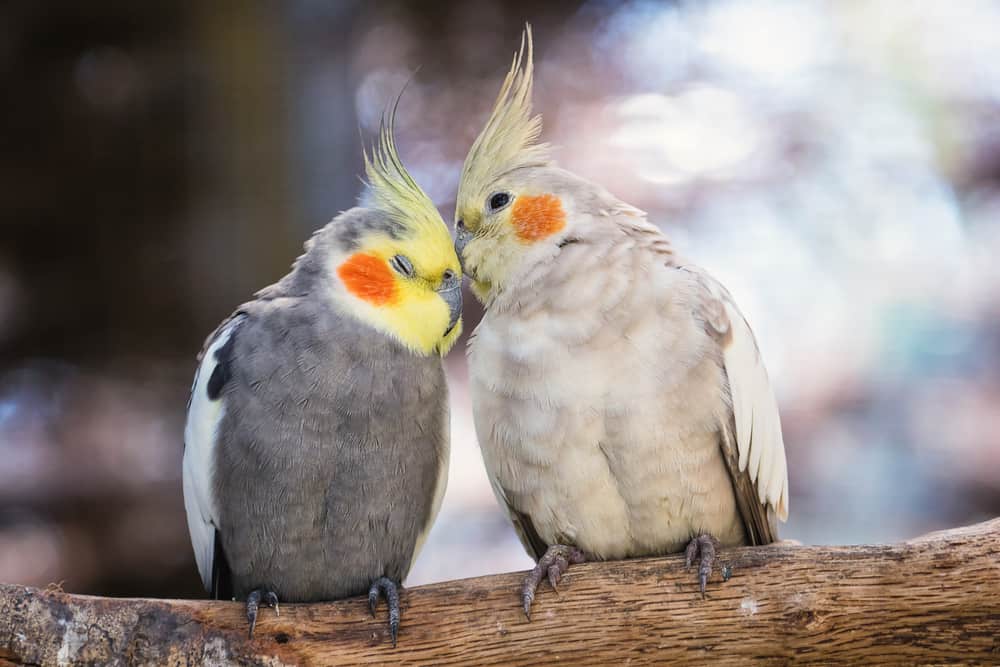Are you thinking about getting a cockatiel as a pet and want to know what is best to feed it? Do you already have a cockatiel and are curious about other foods you can give them to try? Are you looking after a cockatiel temporarily and need to know what they can eat?
I will answer these questions and more below, through extensive research motivated by the interest in them and the deep love of animals that I possess. I will enter into topics such as safe and unsafe foods, the regularity of their eating patterns, and many FAQs.
What are Cockatiels?
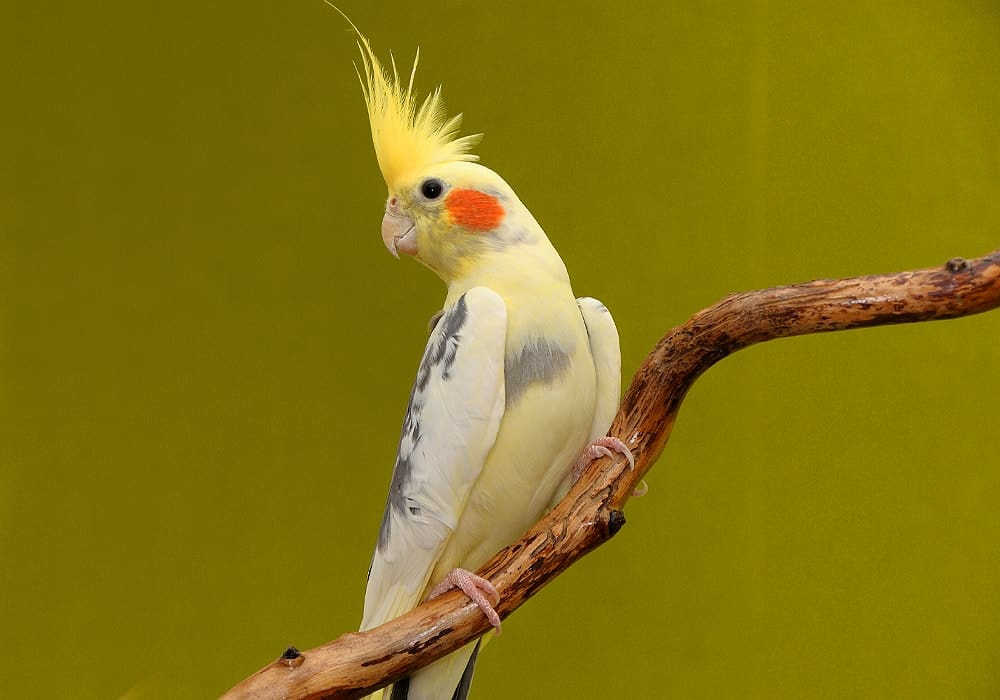
Cockatiels are a type of parrot that are of medium size and are very popular as pets around the world. They usually have feathers that are a mixture of yellow, white, and grey, along with a grey beak and have two vibrant orange spots on each cheek.
They also have a distinctive plumage on the top of their heads, usually yellow, grey, or white. They originally came from Australia but are now bred internationally due to their rise in popularity. They come from the same family tree as cockatoos.
Their estimated average life expectancy is around 10-15 years – though that is only for domestic cockatiels.
What Can Cockatiels Eat as Pets?
According to the PetSmart cockatiel guide, there are a variety of different foods that are suitable for domestic cockatiels, each fitting into one of these three categories:
Pellets and Seeds
Pellets and seeds make up 75% of a domestic cockatiel’s diet. Examples of seeds that the bird can eat are:
- Sunflower seeds
- Canary grass seeds
- Flax seeds
- Safflower seeds
However, VCA Hospitals state that eating too many seeds can lead to calcium and Vitamin A deficiencies in the birds, so a pelleted diet is better for their overall nutrition.
There are also two main types of pellets – vitamin enriched, and fruit flavoured. Pellets are made of ingredients such as oats, millet, cornmeal, and soy.
The combination of seeds and pellets provides the bird with an Omega-3 rich diet and keeps them healthy. This is essential as cockatiels are prone to diet-related health issues such as feather picking, egg binding, and iodine deficiencies.
The ratio of pellets to seeds should be around 75/25, and the amount given should be 30-40 grams in total each day.
Fruits and Vegetables
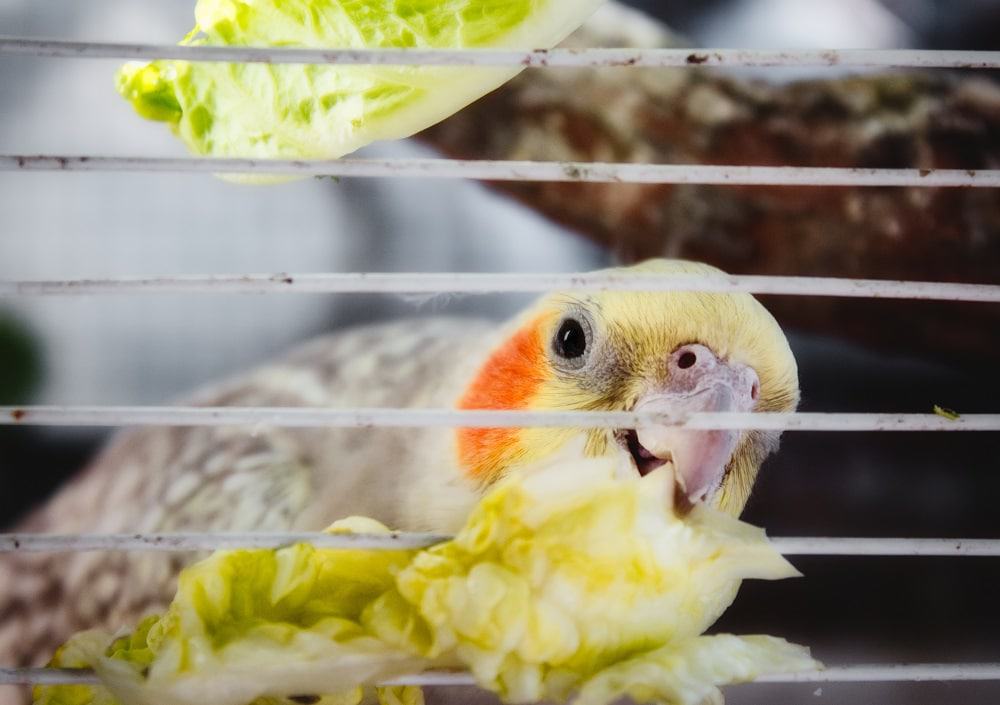
PetSmart recommends that cockatiels have some form of fruit or vegetables every other day. Wash them before giving them to the bird in case there are any chemicals present. There are many different fruits you can give to your cockatiel to try:
- Melon
- Nectarine
- Kiwi
- Papaya
- Strawberries
- Apricot
- Apple
- Banana
- Peaches
- Cantaloupe
- Mangoes
- Grapes
- Grapefruit
- Oranges
- Coconut
They can also have dried fruits such as raisins or dates. Remove all seeds before consumption.
As for vegetables, you should aim to mostly get greens such as kale, cabbage, dandelion leaves, iceberg lettuce, celery, cucumber, and asparagus. You can also give them fresh vegetables such as:
- Carrots and Carrot Tops
- Pumpkin
- Tomatoes
- Broccoli
- Sweet potato
- Corn
- Sprouts like Brussel Sprouts
- Peppers
- Chinese Vegetables such as Bok Choy
- Zucchini
- Lentils
This gives them additional minerals and nutrients that they may not get in pellets.
Wild Foods
Wild foods are foods that cockatiels would eat if they were in their natural environment. There are specific brands that make wild bird food, and these packets of commercial seed mixes are filled with freshly harvested seeds, nuts, flowers, legumes, and fruit.
Treats
Every so often, cockatiels can have treats such as a honey stick or some millet spray to snack on. These should only be given to the bird once a month. They can also sometimes have dairy products, also in moderation.
It was believed that grit helped a cockatiel with its digestion, but it has been found to be an unnecessary addition to a domestic cockatiel’s diet.
What Can Cockatiels Not Eat?
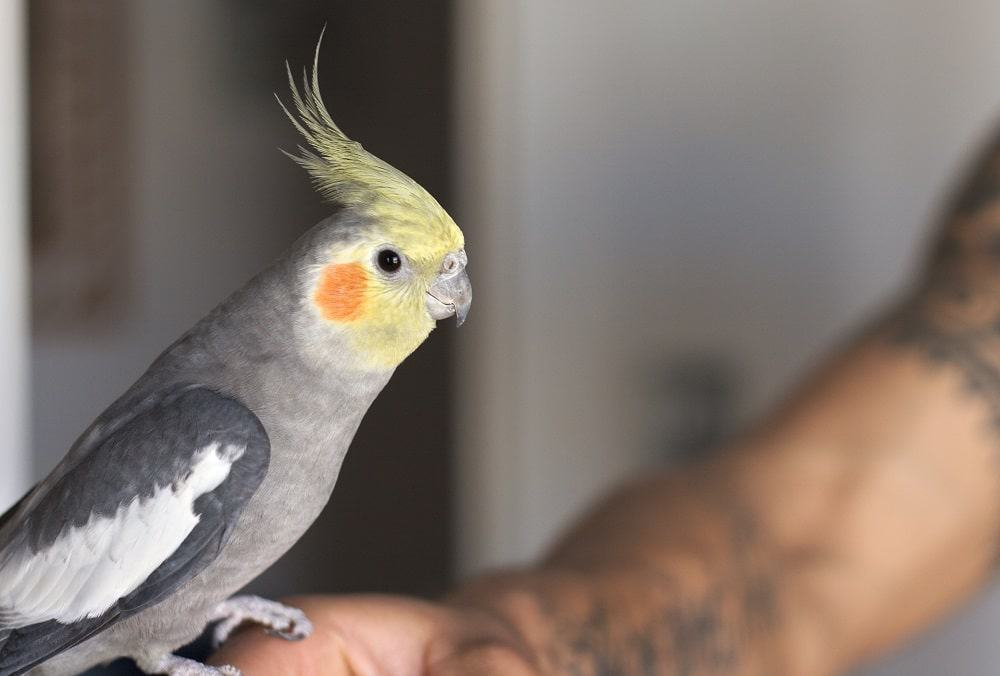
Cockatiels are herbivores, meaning that they only eat a plant-based diet. Though they could stomach some meats or meat products such as chicken, cheese, or yogurt in small amounts, it isn’t recommended that they are given these foods.
There are some foods, in particular, that should never be given to a cockatiel as they contain toxins that can make the bird seriously ill. Zupreem has compiled a helpful guide that has inspired the list below:
Fruit seeds and pits
seeds and pits found in fruits such as apples, apricots, pears, and cherries contain a very small amount of a cyanide compound that affects their heart. Remove the seeds before feeding them fruit to make it non-toxic.
Avocado
Avocado leaves contain a fatty acidic substance called persin. If this is eaten by a cockatiel, it can cause health issues such as weakness, heart problems, and breathing troubles.
Caffeine
Caffeine is a stimulant that makes your heart rate increase and gives you a short-term boost of energy. In birds, even a small amount can cause cardiac irregularities and sometimes a heart attack, which could be fatal.
Chocolate
Much like with dogs, chocolate is toxic to birds due to the caffeine content and a chemical called theobromine. This combination causes symptoms such as diarrhea, vomiting, tremors, irregular heartbeat, and even seizures.
Salt
Salt is bad for birds as even a small amount can upset the delicate balance of electrolytes and fluids. This leads to dehydration, excessive thirst, and even kidney failure, which could be fatal.
Xylitol
Xylitol is a chemical that acts as an artificial sweetener. It is used in many diet foods and drinks to make it taste better, but exposure to animals can lead to liver failure and sometimes death.
The effects haven’t been studied in depth in birds, but it is best to avoid giving them anything with xylitol in altogether.
Fatty Foods
High amounts of fat are bad for birds as it leads to high cholesterol, clogged arteries, heart disease, and other obesity-related illnesses.
Onions
Onions contain sulphur, which erodes the sensitive wall of a bird’s beak and oesophagus and can cause mouth ulcers. Whilst this is uncomfortable in itself, these mouth ulcers can lead to anaemia if left untreated.
Rhubarb
Rhubarb cannot be eaten because it contains oxalic acid, which is poisonous to birds.
Garlic
Garlic cannot be given to birds because it contains a chemical called allicin. This too can lead to anaemia and weakness, which should be treated straightaway.
How Often Do Cockatiels Eat?
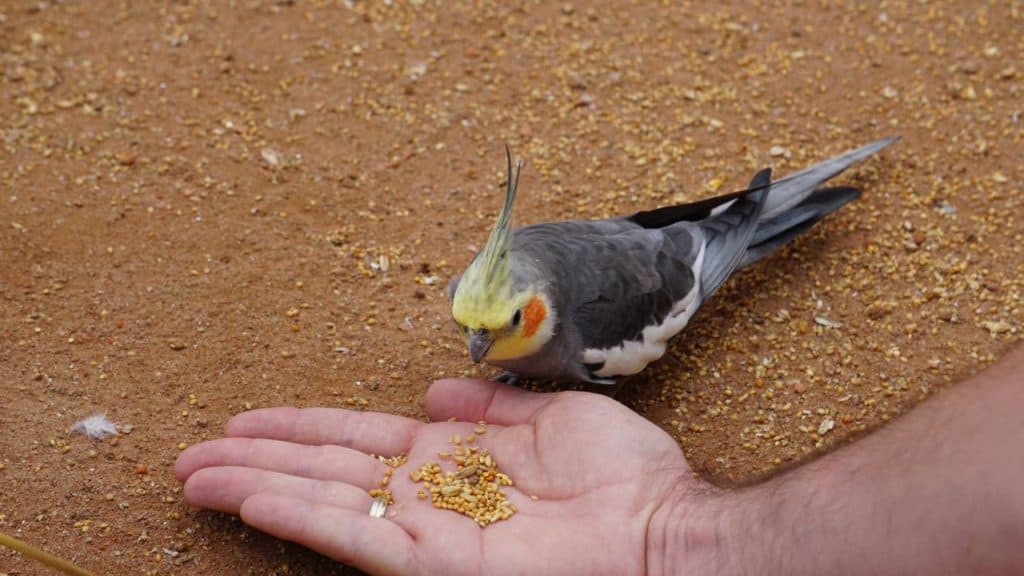
According to Mufasa Pets, in the wild, cockatiels eat twice a day: once in the morning and once in the early evening. This is because they tend to rest in the middle of the day as it’s usually too hot for them to go out foraging.
If you have a cockatiel as a pet, it is best to stick to their natural regimen, but there is no harm in keeping their food bowl and water bottle full and accessible throughout the day. Ensure that you change the food and water at least once a day.
Conclusion
In summary, domestic cockatiels can eat the following foods:
- A variety of seeds including sunflower and flax seeds
- Vitamin-enriched pellets that can have fruit flavourings
- Different fruits such as apples, bananas, berries, and papaya
- Dark leafy green vegetables like kale, spinach, and lettuce
- Honey sticks once a month
FAQs
Are Cockatiels Good Pets for Kids?
Yes, cockatiels are the ideal pet for a child as they are friendly, docile, and can be cared for easily under adult supervision. They are fairly low maintenance, meaning they are also ideal for beginner pet or first-time bird owners.
A video on how you can effectively care for a pet cockatiel can be found here, courtesy of YouTube channel Bird Nerd Sophie.
Where can you buy a Cockatiel?
You can buy a cockatiel from either a reputable breeder or a trusted pet store. You should make sure that the bird is healthy and has been reared in the best conditions possible. Some rescue centres may also have cockatiels available for adoption.
How Big Should a Cockatiel’s Cage Be?
Cockatiels need a fairly large cage as they like to be able to flit around, play, and explore. Ideally, their cage should be around a minimum of 24” long and 18” wide. That measurement applies only if you have a single bird, two or more birds need more space.
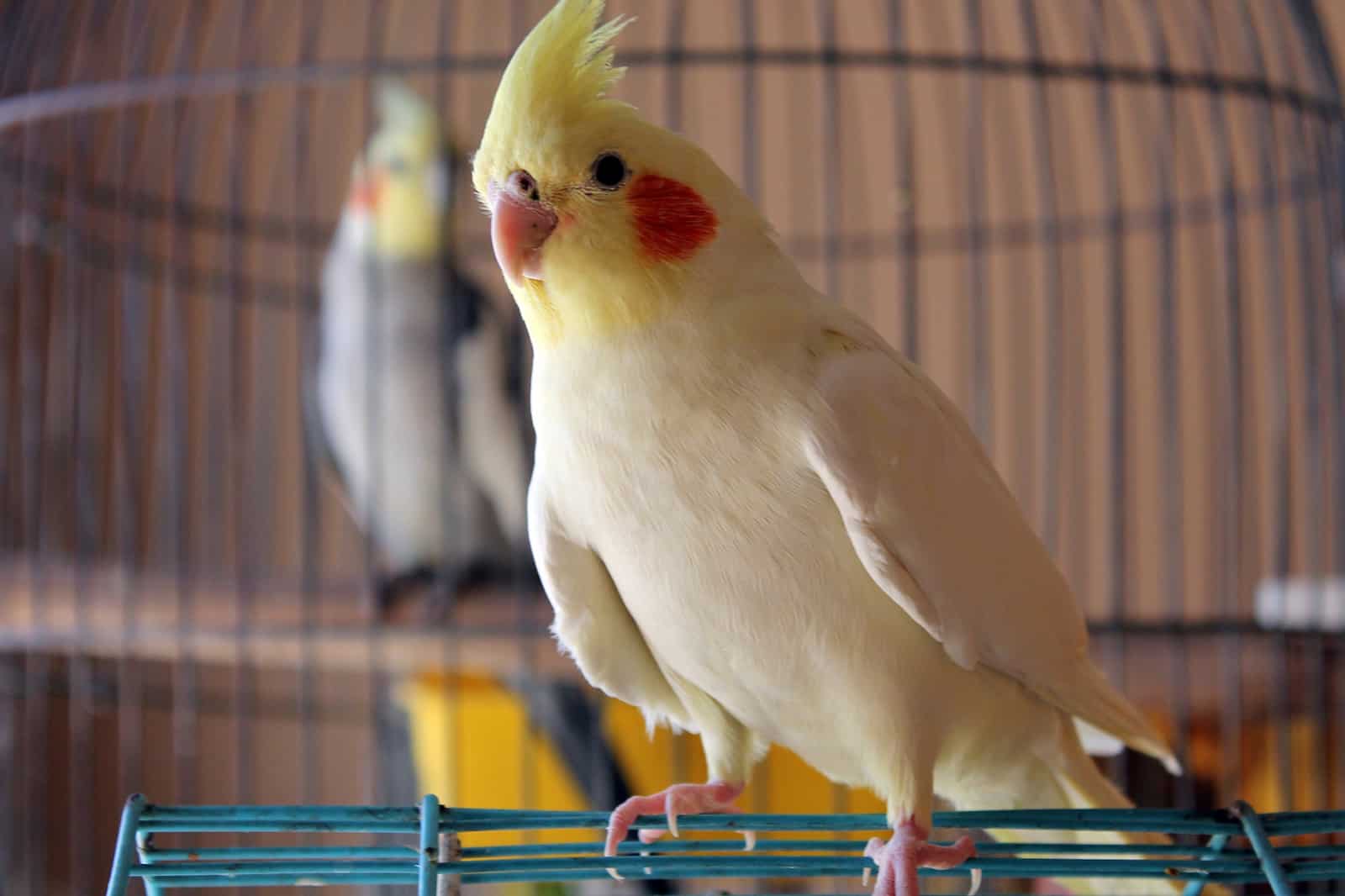
What Kind of Toys do Cockatiels Like?
Cockatiels are active and inquisitive, so giving them toys is a great way to stimulate them and give them a way to burn off energy safely.
The best kind of toys mimic activities they carry out in the wild, so anything that gives them the opportunity to perch, destroy, and scavenge. There are many toys on the market, and a few of the best are linked below thanks to PetKeen:
- Planet Pleasures Pineapple Foraging Bird Toy
- JW Pet Activitoy Birdie Disco Ball Toy
- Prevue Pet Coco Hideaway Bird Toy
If you have any queries or comments, please let us know and we will get back to you as soon as we can.
